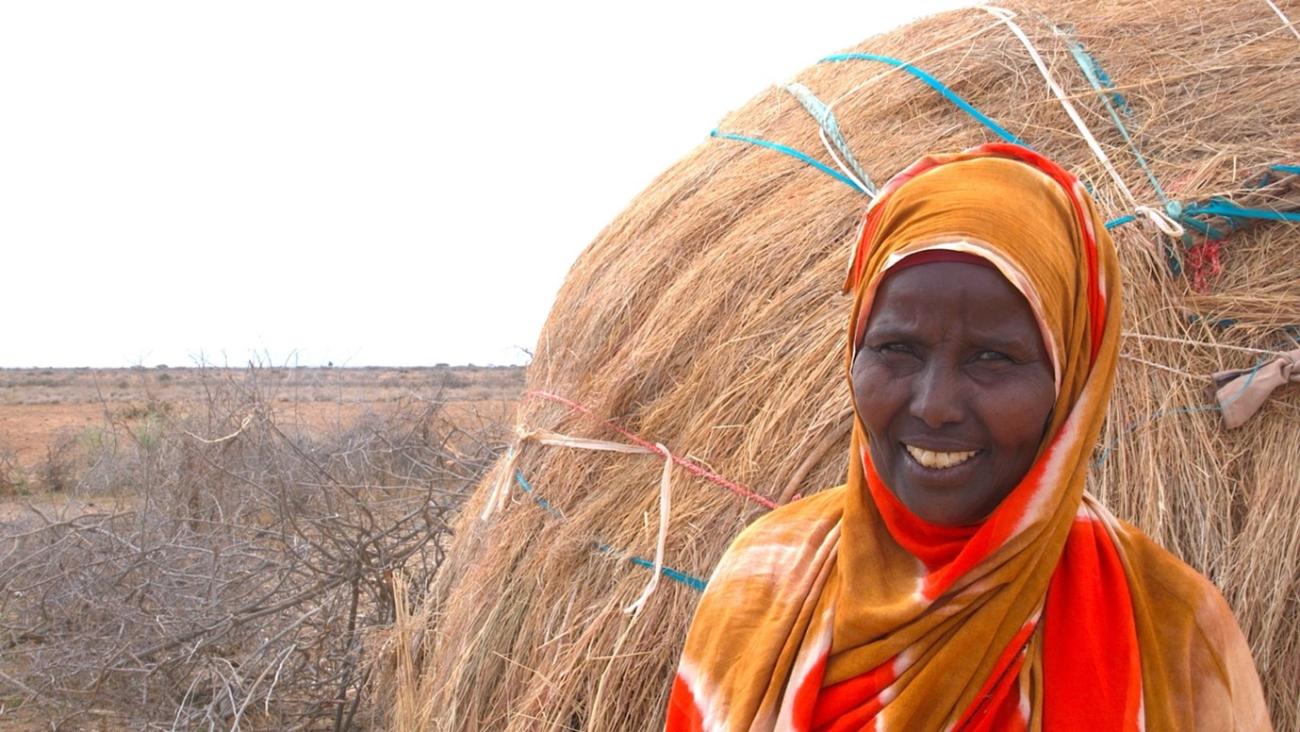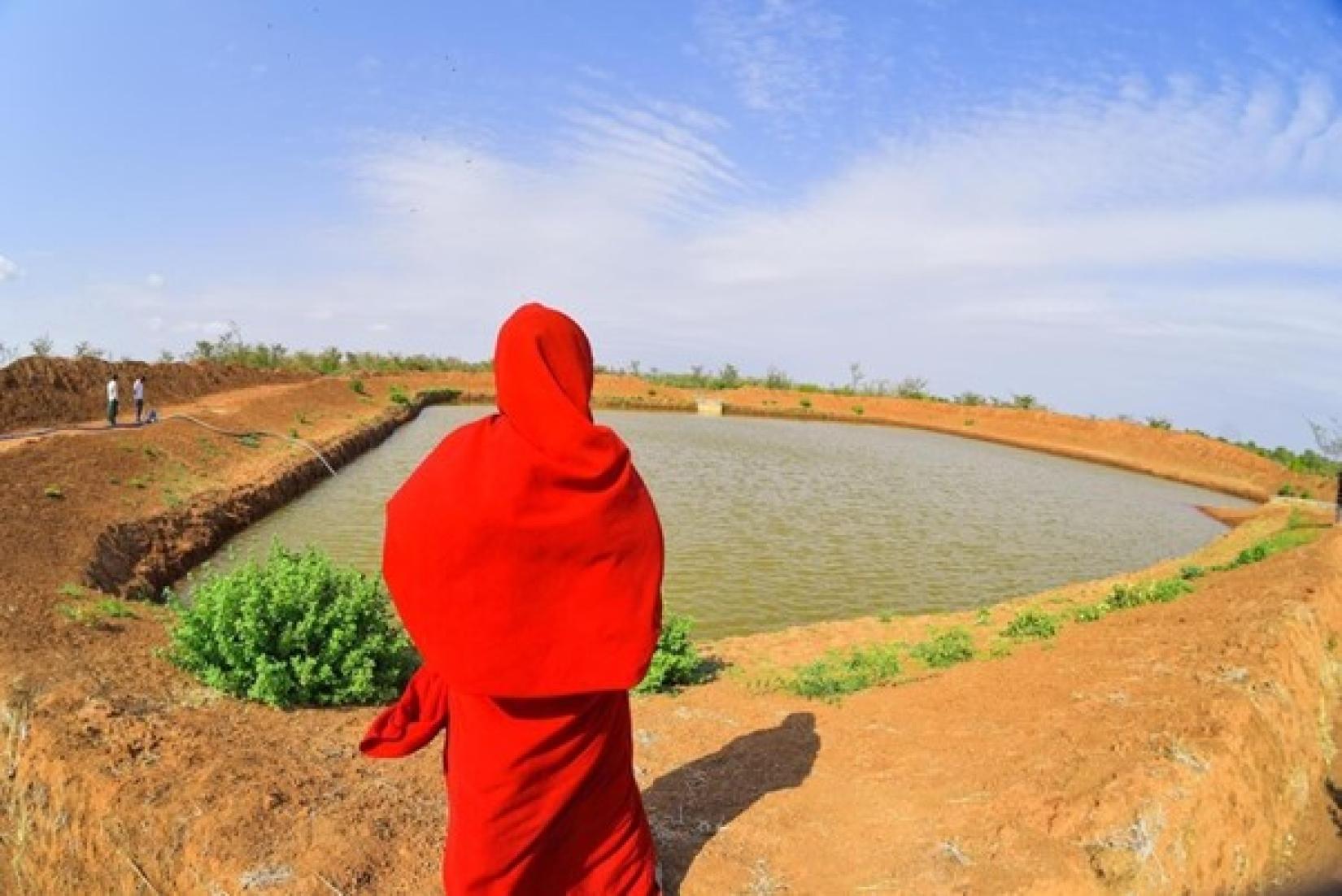Ethiopia: The Pond that Keeps Giving
“Our lives depend on another life. If our livestock die, our future becomes uncertain.”

Caption: Anab Abduakkahi lives in the Somali region of Ethiopia with her 10 family members
Photo: © WFP/Sophie Smeulders
Anab Abduakkahi, 50, lives in the drylands of Ethiopia’s Somali region. Anab has spent the last 50 years navigating these lands, frequently moving with her family in search of water and pasture for their animals.
She relies on the regions two rainy seasons, which occur between March to April and from October to December, to sustain her livestock and generate income to support her family.
But climate shocks – such as drought – are making it increasingly difficult for people like Anab to find the resources they need.
After five years of back-to-back poor rainy seasons, many animals have died, leading to income losses of up to 35 percent for pastoralists and 25 percent for farmers dependent on crop production.
“During the dry seasons, we sometimes we have to travel 20km to find water, without having anything to drink or eat. We worry about sending our children on these journeys, knowing they faced the risk of violence along the way.”
“Each dry season, I lose up to ten animals due to starvation, exhaustion and wild animal attacks on the journey,” she adds.
But this dry season, everything changed for the better.
The United Nations World Food Programme (WFP) is building 57 water harvesting sites in the region—such as ponds and solar-powered irrigation systems—to provide a lifeline to communities like Anab’s.

Caption: The Ubaley pond full of rainwater in the height of the dry season in August 2024.
Photo: © Michael Tewelde
Anab’s home is nearby Ubaley pond, one of the first sites to be completed. The rain-fed pond was constructed following a number of topographical assessments and community consultations, utilising local knowledge on where water collects when it rains.
The 60×60 meter pond is connected to a watering trough for livestock, where water is pumped in using a generator fueled by the community. Its fenced off to protect it from wild animals and human damage. The pond was completely filled with rainwater from the March to April rains, with a total capacity of 7.2 million litres.
The pond sustained the community throughout the entire dry season – from April to October – providing water for 2,590 sheep and goats, 1,630 cattle,
and 500 camels, benefiting approximately 5,142 household.
For Anab, the benefits of the pond go beyond just water; they are fourfold.
“If we fix issues of water, we fix issues of health, school enrolment, and livelihoods,” says Peter Weke, Livelihoods, Resilience and Rangeland Management Officer in Gode, Somali region.
First, the pond provided water to her livestock throughout the dry season, helping her reduce losses and even increase their numbers.
“I didn’t lose a single cow or goat this dry season. In fact, my number of livestock increased – one of my goats had four offspring,” she says.
Secondly, continuous access to water improved her livestock’s health and enhanced both the quality and quantity of the milk produced, translating into better income in the market and nutrition for her family.
“For the first time in my life, I have been able to save part of my income. This dry season I saved ETB 10,000, which I plan on using to set up a business in my village buying and selling vegetables and growing some crops,” she says proudly.
Anab has invested her savings in her Village Saving and Loan Association (VSLA), one of 190 established by WFP in the region. Her money is in the group’s revolving fund, allowing members to take out loans for business ventures. She expects to receive her payout in the next few months to launch her business.
Third, Anab is happy that her family is finally safe, and she gets to stay with her community.
“Mentally, I feel much better. Previously, as the dry season started, my village would have started to part ways to find water. We wouldn’t know what happened to each other. My grandchildren are also now feeling safe, as they no longer have to travel long distances to find water,” she says.
Fourth, the pond is helping to keep her children in school.
“My children are happy that we didn’t have to move this dry season; they love going to school. Previously, we had to move often, and their education suffered,” she says.
Anab’s community is equally aware of the multiple changes the pond has brought and is committed to maintaining it. She is a member of the community’s management committee, responsible for ensuring its upkeep and sustainable use and addressing any issues that may arise. The community are also planning on planting trees around the pond to help absorb excess water, keeping the pond’s banks stable.
Anab plans to stay in her village as long as the pond continues to be filled each rainy season. However, with climate shocks intensifying and rain becoming more and more unpredictable, the future is uncertain.
Despite this, Anab is in the best place she can be, and remains hopeful for the future, envisioning a life where she and her children are self-reliant and able to thrive in their community without any external support.
***
Source: This story is authored by Claire Nevill, Communications Head, WFP Ethiopia, and was published on UN Ethiopia’s website.